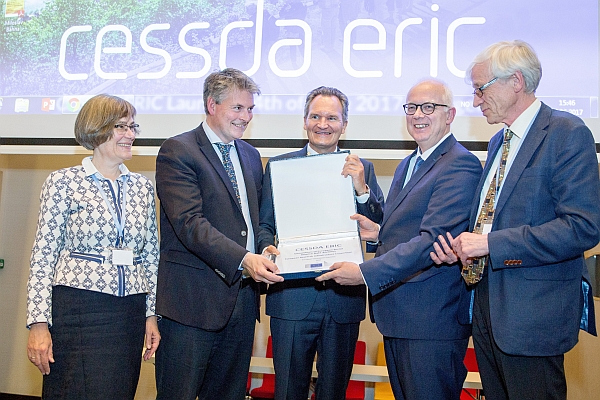Text: Kaisa Järvelä, photo: CESSDA ERIC/Eivind Senneset
Researchers Will Soon Have Access to Thousands of European Datasets through CESSDA Catalogue
The Consortium of European Social Science Data Archives was granted the status of European Research Infrastructure Consortium (ERIC) last summer. This year, a new data catalogue providing access to thousands of data sets across Europe will become available. In addition to providing access to data, CESSDA supports research in the social sciences by training European data archiving professionals and researchers.
How will European researchers benefit from CESSDA, Director Ron Dekker?
"We work on better accessibility of data. It is crucial for researchers to have seamless access to relevant social science data in a safe and secure way.
As CESSDA service providers, European data archives are also regularly developing tools and services to simplify and improve the depositing of data.
CESSDA emphasises safety in data preservation and reuse. Researchers must have safe and secure access to data, including sensitive data.
This is why all CESSDA service providers should aim to receive the CoreTrustSeal certification, awarded to trusted digital repositories."

CESSDA became an ERIC in June 2017, and the celebrations were held in Bergen, Norway. Ron Dekker is the second from the right.
What kinds of services will CESSDA offer to researchers?
"The data catalogue, which will be available in 2018, will contain the metadata of all data in the holdings of CESSDA service providers. It will be a one-stop-shop for search and discovery, enabling effective access to European research data for researchers.
The catalogue is a big technical feature and one which CESSDA has been meticulously working at for several years, under the stewardship of the CESSDA Technical Group.
Alongside data technology improvements, CESSDA will also provide a number of trainings. Technology and training go hand in hand.
The CESSDA website itself is a useful resource for researchers as they can find out more about the archives and services in each country in one place. Regular news items and postings on social media channels also mean that researchers can easily follow happenings within CESSDA. These channels provide easy access to information on upcoming trainings, for example."
What kind of trainings will be provided by CESSDA and who will organise the training in practice?
"CESSDA Training has established itself as a trademark for high-quality trainings in both digital preservation and data management, as well as a 'train the trainers' programme.
We provide trainings and material for both data archives and researchers. Training is a key aspect of our mission to support and facilitate teaching and learning in the social sciences.
Providing training is a joint CESSDA activity which involves the CESSDA Main Office, as a facilitator, and the service providers, as the experts."
What added value will CESSDA bring to the services offered by individual service providers?
"CESSDA enables service providers to join forces and expertise. CESSDA's role is very much to be the hub where knowledge is shared, and new skills are developed in the field of social science data.
On trust issues, we provide support and advice for service providers wishing to obtain or renew their DSA-certification – we take care of the quality of the services that they provide.
CESSDA is an ideal partner in European projects in the framework of the European Commission's Horizon 2020 research and innovation programme, as it gives access to relevant expertise in the field of social science data across a range of countries.
In addition, we coordinate and submit grant proposals to acquire funding for projects. Once the project is awarded, all CESSDA service providers have the opportunity to be involved in aspects of the project where they have expertise and knowledge.
CESSDA is also an interesting partner for other European or national infrastructures to cooperate with, as demonstrated by our current SERISS (Synergies for Europe's Research Infrastructures in the Social Sciences) project which brings together three infrastructures in the social sciences: ESS – European Social Survey, SHARE – Survey for Health Ageing and Retirement in Europe, and CESSDA.
CESSDA gives its data archives a united voice, which is beneficial in political decision making at the EU level."
What are the most important developments planned for CESSDA for the coming years?
"CESSDA wants to be recognised as a leading European technical infrastructure. This means technological development will be high on our agenda.
Both data producers and data users are in constant need of new and better tools and services to carry out their research. One of the goals of the CESSDA Technical Group is to meet the needs of researchers.
CESSDA intends to be actively engaged in the European Open Science Cloud (EOSC) and realise a social science data platform.
Naturally, we also wish to widen our membership and reach full European coverage. One aim is that all our service providers should be acknowledged as trusted data repositories."
What changed when CESSDA became an ERIC in the summer of 2017?
"Being an ERIC gives CESSDA extra visibility and acknowledgement in Europe. It is a signal of long-term commitment not only by its members, which are national ministries, but also by the European Commission.
We are looking forward to featuring in the ESFRI 2018 Roadmap which will be launched early this year and which will secure CESSDA's place in the ERIC family."
What are you proud of when you think about CESSDA at the moment?
"I am especially proud of the people. The CESSDA Main Office has a committed team and I am grateful to the service providers for the multitude of highly-qualified and motivated staff.
CESSDA already offers plenty of tools and services, and many are in the pipeline. Moreover, there is an abundance of expertise and ideas throughout the consortium.
Our job at the CESSDA Main Office is to organise it all and turn this collaboration into value for all of our stakeholders: funding agencies, data service organisations, data producers and data users."
